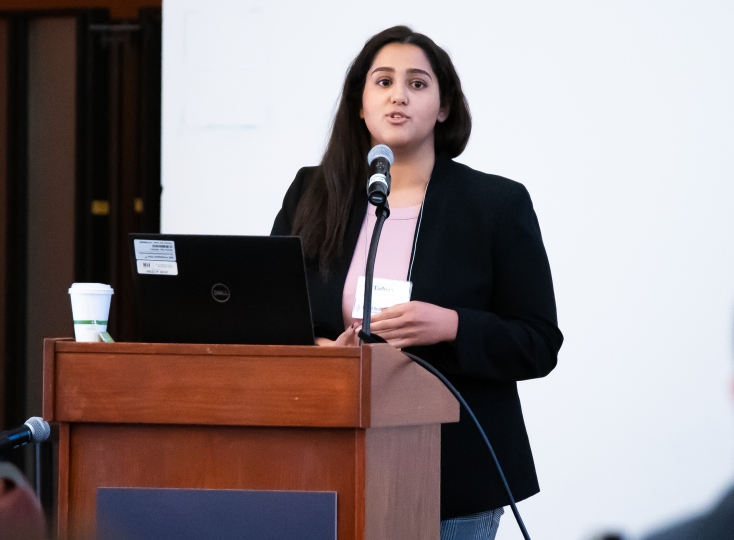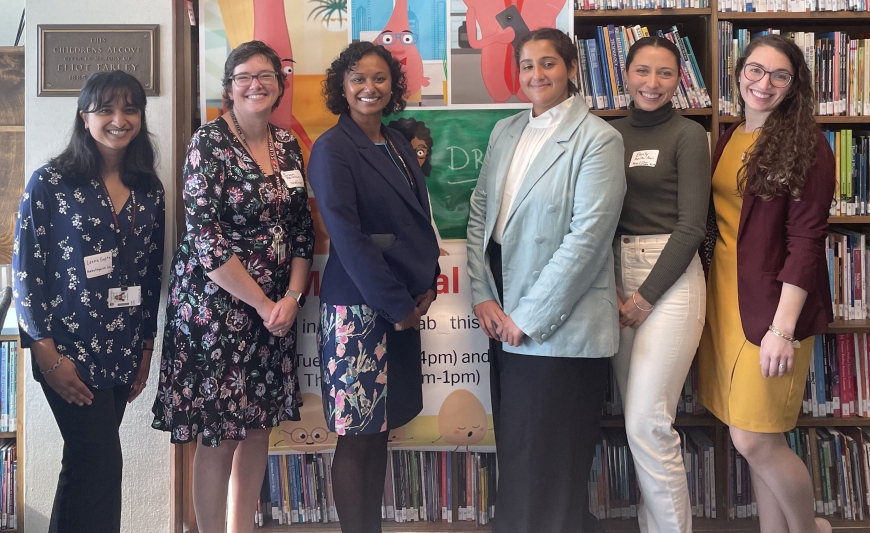Tatheer Adnan, S.B. '20
A passion for community service and social impact guided many of the choices Tatheer Adnan made while studying bioengineering at the Harvard John A. Paulson School of Engineering and Applied Sciences (SEAS), including becoming a project lead for Harvard Engineers Without Borders, conducting research for the Boston Healthcare for the Homeless program and volunteering with the Harvard Square Homeless Shelter.
“I was so fascinated and inspired by the work Boston Healthcare for the Homeless was doing that I applied to research positions in the program,” she said. “That’s when I realized I really enjoyed tying my research to giving back to the community and working towards social impact and justice.”
Adnan, S.B. '20, hasn’t lost that passion since graduating. She currently is a data strategy intern for the Los Angeles County Department of Public Health, working with the Office of Violence Prevention to study how to reduce gun violence using data and an engineering framework.
“The results of this work are so tangible, and they’re so important that it’s not hard to see the value of what I’m doing on a day-to-day basis,” she said. “So much emphasis is given to mass shootings, which are traumatic and horrifying, but they’re isolated incidents. What that sometimes blinds people to is the everyday numbers around gun violence and how common firearm assaults, injuries and deaths are even outside these major one-off events. We also want to bring to life how common and everyday the problem is.”
Originally from Staten Island, New York, Adnan arrived at Harvard planning to study a subject like molecular and cellular biology or chemistry, with the eventual goal of going to medical school. But in her second year, her academic interests began to shift. She’d eventually make her way to the laboratory of David Mooney, Robert P. Pinkas Family Professor of Bioengineering at SEAS.
“The fun part for me was always interpreting the results of experiments,” Adnan said. “Realizing that I liked the more hands-on, interpretive parts of science, I switched over to engineering. But I still wanted to have a human biology focus, so that’s how I found bioengineering.”
Tatheer Adnan, third from the right, with her team at the Museum of Science in Boston.
Adnan worked as a data scientist for pharmaceutical company Amgen after graduating but never got away from her belief that data and science can create positive change. In July 2021, she became a project manager at the Boston Museum of Science, designing an exhibit around sexual health education and menstruation. She’s currently creating more content for the museum.
“Bioengineering definitely equipped me with a broad technical skill set, but a huge part of the degree was understanding anatomy and physiology, which was so useful when designing an exhibit around a biological system as intricate and complicated as the female reproductive system,” she said. “Sexual and reproductive health is very under-represented in spaces such as museums. When we first began this effort, it was largely an effort to expand the information the museum can offer to a very diverse audience. We decided that menstruation, given that it’s such a universal experience yet still so stigmatized and so poorly understood by children and caregivers, would be a good starting point.”
Once the Museum of Science exhibits were up and running, Adnan took on a part-time research position at the University of California-San Francisco. She studied the intersections of social media and social justice movements such as Black Lives Matter, and how that data might predict incidents of racial violence. After finishing that research in June, Adnan switched to the Office of Violence Prevention project in L.A.
“A big part of the novelty of our approach is that we’re treating gun violence like a public health problem, and treating it much like we’d treat any other chronic disease or condition,” she said. “We’re approaching how we understand this problem in a very similar way: understanding root causes, understanding physical manifestations, which we refer to as symptoms, and then evaluating different treatments that could lead to the best health outcome.”
Adnan is just starting this new research initiative, which will draw on a wide range of stakeholders including gun owners, law enforcement, gun retailers, and victims of gun-related incidents. The goal is to include all of them without stigmatizing any single community.
By combining the knowledge she gained at Harvard with the passion for social impact that she’s had all her life, Adnan is well-equipped to tackle such a large challenge.
“Every day in the projects that I’ve been part of since I’ve graduated, I’ve definitely drawn on the technical skill set that I came out with as part of my degree,” she said. “But I’ve also drawn on a lot of communication and public speaking skills that I had a lot of opportunities to exercise in my time at Harvard. That’s the one thing that summarizes what my life after graduation has looked like. It’s been a lot of looking for opportunities that are going to cater to my interests and passions. Then, when those opportunities have come across, go in and take them.”
Press Contact
Matt Goisman | mgoisman@g.harvard.edu

